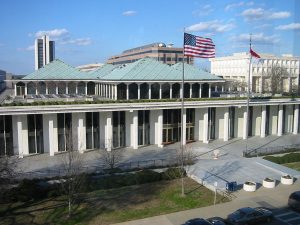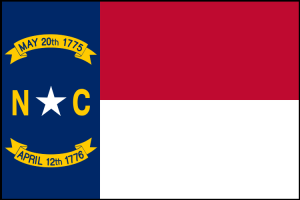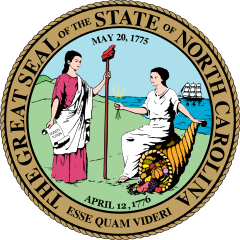North Carolina’s General Assembly has extended the legislative session to adjourn sine die on September 3. This extension will allow for consideration of matters related to the COVID-19 pandemic. Registered lobbyists who make an expenditure on legislators and legislative employees […]
North Carolina’s General Assembly has extended the legislative session to adjourn sine die on September 3.
This extension will allow for consideration of matters related to the COVID-19 pandemic.
Registered lobbyists who make an expenditure on legislators and legislative employees will also be required to file monthly reports.
This is the case, as the General Assembly is still in session due to the extension.
Monthly reports are due 10 business days after the end of the month.
In addition, the August report will be due on September 15.
A monthly report for September will not be required as that activity may be incorporated in the Quarterly report due on October 21.
June 3, 2020 •
Republican Convention Will Not Be Held in North Carolina
After a prolonged standoff with the state’s Democratic governor, President Donald Trump says Republicans will seek another state instead of North Carolina to hold its August convention. Gov. Roy Cooper rejected a proposal for a full convention and insisted on […]
After a prolonged standoff with the state’s Democratic governor, President Donald Trump says Republicans will seek another state instead of North Carolina to hold its August convention.
Gov. Roy Cooper rejected a proposal for a full convention and insisted on scaling back the event due to uncertainty as to what the status of the COVID-19 pandemic will be in August.
Several other locations are expected to or have already expressed interest in hosting the event, but the GOP is still weighing its options for the event.
Secretary of State Elaine F. Marshall has announced a grace period to file the first quarter lobbyist and principal reports due April 22. This comes in response to the COVID-19 pandemic and the importance of social distancing, Penalties for failure […]
Secretary of State Elaine F. Marshall has announced a grace period to file the first quarter lobbyist and principal reports due April 22.
This comes in response to the COVID-19 pandemic and the importance of social distancing,
Penalties for failure to timely file will not be levied if report is filed on or before July 22; is accompanied by a sworn and notarized statement that a notary could not be obtained prior to the date the report was filed; and all other reports due by July 22 are timely filed.
March 24, 2020 •
North Carolina Runoff Election Postponed
The North Carolina Board of Elections issued an emergency executive order postponing the runoff election in the Republican primary for the 11th Congressional District. The election will be moved from May 12 to June 23 to accommodate concerns regarding the […]
The North Carolina Board of Elections issued an emergency executive order postponing the runoff election in the Republican primary for the 11th Congressional District.
The election will be moved from May 12 to June 23 to accommodate concerns regarding the COVID-19 outbreak.
January 17, 2020 •
North Carolina Adjourns until Spring without a Resolution to Outstanding Budget Measures
The North Carolina General Assembly adjourned the regular session until April 28 after meeting for a single day. The Senate attempted but failed to override vetoes by Gov. Roy Cooper on teacher pay and the budget. Before adjourning, lawmakers unanimously […]
The North Carolina General Assembly adjourned the regular session until April 28 after meeting for a single day.
The Senate attempted but failed to override vetoes by Gov. Roy Cooper on teacher pay and the budget.
Before adjourning, lawmakers unanimously approved additional funding for the state’s scholarship for children of wartime veterans, which is expected to be signed into law by Cooper.
November 21, 2019 •
North Carolina Legislature Adjourns
The North Carolina General Assembly adjourned after finalizing a replacement map for congressional districts. Legislators extended the legislative session to redraw the map due to state judges blocking lines drawn in 2016 from being used next year. The session was […]
The North Carolina General Assembly adjourned after finalizing a replacement map for congressional districts.
Legislators extended the legislative session to redraw the map due to state judges blocking lines drawn in 2016 from being used next year.
The session was one of the longest legislative sessions in recent history due to the redistricting lawsuit and a fight over the budget.
November 19, 2019 •
North Carolina Lawmakers Redraw State’s Congressional Map
A replacement map for North Carolina’s congressional districts was finalized with new lines drawn to address alleged extreme partisan bias. The map was redrawn after state judges blocked lines drawn in 2016 from being used next year. The judges ruled […]
A replacement map for North Carolina’s congressional districts was finalized with new lines drawn to address alleged extreme partisan bias.
The map was redrawn after state judges blocked lines drawn in 2016 from being used next year.
The judges ruled there was enough evidence of partisan gerrymandering to make it likely that the 2016 map violated the state constitution.
The voters whose legal challenge led to the new map went to court immediately to oppose the newly drawn map.
However, the North Carolina Supreme Court refused to fast-track the redistricting appeal.
Without a bypass to the state Supreme Court, any appeal would have resulted in a lengthy process that would likely not have been resolved until the 2020 elections were over, making a ruling largely moot.
November 5, 2019 •
North Carolina Court Blocks Current State House Districts for 2020 Elections
On Monday, October 28, a state court blocked the use of current congressional districts in North Carolina for the 2020 elections. The ruling could lead to the drawing of new districts that would make several Republican-held districts far more competitive. […]
On Monday, October 28, a state court blocked the use of current congressional districts in North Carolina for the 2020 elections.
The ruling could lead to the drawing of new districts that would make several Republican-held districts far more competitive.
A panel of three Superior Court judges issued a preliminary injunction preventing elections under the district lines, starting with the March 3 primary.
The judges ruled that voters had a strong likelihood of winning a lawsuit that argued Republicans unlawfully manipulated district lines for partisan gain.
The judges gave no date by which a new map must be drawn.
However, the judges suggested lawmakers could redraw them on their own quickly to ensure congressional primaries be held as scheduled.
The State Board of Elections has said lines needed to be finalized by Dec. 15.
June 6, 2019 •
North Carolina Ethics Commission Names Interim Director
The reconstituted State Ethics Commission has named Kathleen Edwards the interim director. Edwards, who has been a commission attorney, will take the lead role until a permanent director is chosen. The commission was merged with the State Board of Elections […]
The reconstituted State Ethics Commission has named Kathleen Edwards the interim director.
Edwards, who has been a commission attorney, will take the lead role until a permanent director is chosen.
The commission was merged with the State Board of Elections then was remade as a stand-alone entity again following the passage of House Bill 1029.
Edwards will have to hire a new staff and try to recover several positions the commission lost when it was merged.
April 8, 2019 •
North Carolina House Files Campaign Reform Bills
The North Carolina House has introduced two bills to reform campaign finance. House Bill 512 submits a referendum to voters urging Congress to pass an amendment to the Constitution of the United States declaring that constitutional rights belong to individuals […]
 The North Carolina House has introduced two bills to reform campaign finance.
The North Carolina House has introduced two bills to reform campaign finance.
House Bill 512 submits a referendum to voters urging Congress to pass an amendment to the Constitution of the United States declaring that constitutional rights belong to individuals and not corporations or entities.
The referendum also states that unlimited spending of money on political campaign contributions is not constitutionally protected free speech.
House Bill 510 requires primary elections of Supreme Court, court of appeals, superior, and district court judges to be nonpartisan judicial elections.
The bill also establishes the North Carolina Public Campaign Fund as an alternative source of campaign financing for candidates that demonstrate public support and voluntarily accept strict fund raising and spending.
The fund will be a special, dedicated, non-lapsing, non-reverting fund that participating candidates can use to receive campaign funds.
However, candidates will have higher restrictions on how much money they can receive in contributions and how much they can expend on their campaign.
If passed, House Bill 510 will become effective January 1, 2020.
February 22, 2019 •
North Carolina State Board of Elections Calls for Congressional Redo
The North Carolina State Board of Elections voted unanimously on Thursday in favor of holding a new election in the 9th Congressional District. The election in November between Mark Harris and Dan McCready was riddled with accusations of fraud and […]
 The North Carolina State Board of Elections voted unanimously on Thursday in favor of holding a new election in the 9th Congressional District.
The North Carolina State Board of Elections voted unanimously on Thursday in favor of holding a new election in the 9th Congressional District.
The election in November between Mark Harris and Dan McCready was riddled with accusations of fraud and other misconduct.
According to a bill passed late last year, both candidates, if they decide to run, will have to compete in their parties’ primary elections.
January 9, 2019 •
North Carolina Increases Contribution Limits
The North Carolina State Board of Elections increased the contribution limit in the state to $5,400 for candidate committees and others that are subject to legal limits. State law ties the amount to inflation based on the Consumer Price Index, […]
 The North Carolina State Board of Elections increased the contribution limit in the state to $5,400 for candidate committees and others that are subject to legal limits.
The North Carolina State Board of Elections increased the contribution limit in the state to $5,400 for candidate committees and others that are subject to legal limits.
State law ties the amount to inflation based on the Consumer Price Index, which had a 4.7% increase from July 1, 2016, to July 1, 2018.
The new limit will remain in effect through December 31, 2020.
December 13, 2018 •
Lawmakers Pass a Return to 2016 State Board of Elections Structure
The North Carolina General Assembly passed a bill to return the administration of elections, ethics, and lobbying regulations to the 2016 structure. Voters defeated a constitutional amendment in November to establish an eight-member Bipartisan Board of Elections and Ethics Enforcement, […]
 The North Carolina General Assembly passed a bill to return the administration of elections, ethics, and lobbying regulations to the 2016 structure.
The North Carolina General Assembly passed a bill to return the administration of elections, ethics, and lobbying regulations to the 2016 structure.
Voters defeated a constitutional amendment in November to establish an eight-member Bipartisan Board of Elections and Ethics Enforcement, which would have kept the current structure in place.
An additional provision in the bill requires re-elections when the result of an election is investigated. This would require refiling and participation in a primary and not merely a runoff.
Passage of the voter ID law would not impact any possible 2018 re-election.
The bill further addresses absentee-by-mail ballots which are the topic of the current 9th District board of elections investigation.
The bill now awaits Governor Roy Cooper’s approval.
October 22, 2018 •
North Carolina Special Session Adjourns
On October 15, the North Carolina General Assembly adjourned a special session after passing the Hurricane Florence Emergency Response Act to establish a fund to provide relief and assistance from the effects of Hurricane Florence. The Act also granted funds […]
 On October 15, the North Carolina General Assembly adjourned a special session after passing the Hurricane Florence Emergency Response Act to establish a fund to provide relief and assistance from the effects of Hurricane Florence.
On October 15, the North Carolina General Assembly adjourned a special session after passing the Hurricane Florence Emergency Response Act to establish a fund to provide relief and assistance from the effects of Hurricane Florence.
The Act also granted funds to the Bipartisan State Board of Elections and Ethics Enforcement to educate the public about voting in the November 2018 election, specifically in counties designated under the disaster declaration by the president.
An October 16 ruling by the Wake County Superior Court found the legislative provisions creating the Bipartisan Board unconstitutional. The court, however, stayed the injunction concerning the activity of the Bipartisan Board until after the November election.
State and Federal Communications, Inc. provides research and consulting services for government relations professionals on lobbying laws, procurement lobbying laws, political contribution laws in the United States and Canada. Learn more by visiting stateandfed.com.


